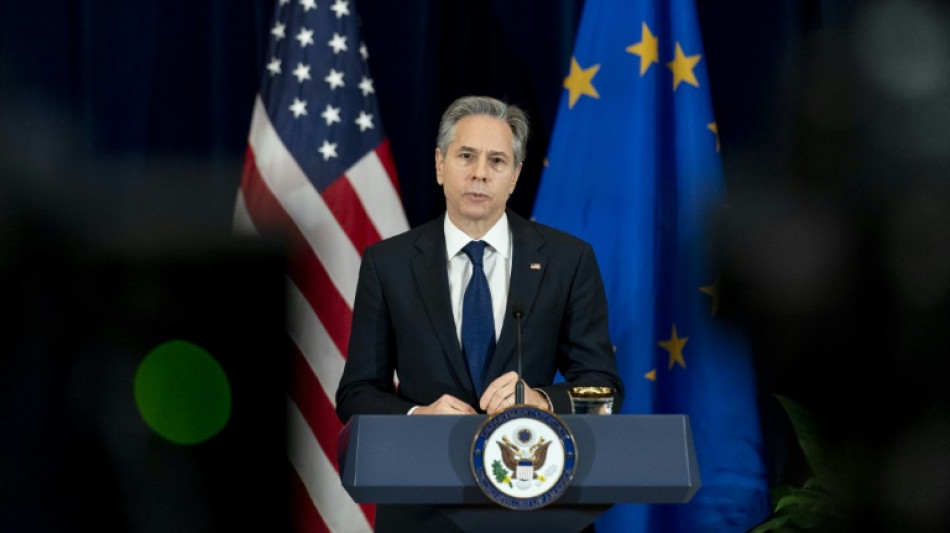
-
 Japan's 'godless' lake warns of creeping climate change
Japan's 'godless' lake warns of creeping climate change
-
US teen Lutkenhaus breaks world junior indoor 800m record

-
 World copper rush promises new riches for Zambia
World copper rush promises new riches for Zambia
-
Paw patrol: Larry the cat marks 15 years at 10 Downing Street

-
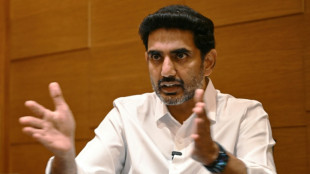 India plans AI 'data city' on staggering scale
India plans AI 'data city' on staggering scale
-
Jamaica's Thompson-Herah runs first race since 2024

-
 Crash course: Vietnam's crypto boom goes bust
Crash course: Vietnam's crypto boom goes bust
-
Ahead of Oscars, Juliette Binoche hails strength of Cannes winners

-
 US cattle farmers caught between high costs and weary consumers
US cattle farmers caught between high costs and weary consumers
-
New York creatives squeezed out by high cost of living

-
 Lillard matches NBA 3-point contest mark in injury return
Lillard matches NBA 3-point contest mark in injury return
-
NBA mulling 'every possible remedy' as 'tanking' worsens

-
 Team USA men see off dogged Denmark in Olympic ice hockey
Team USA men see off dogged Denmark in Olympic ice hockey
-
'US-versus-World' All-Star Game divides NBA players

-
 Top seed Fritz beats Cilic to reach ATP Dallas Open final
Top seed Fritz beats Cilic to reach ATP Dallas Open final
-
Lens run riot to reclaim top spot in Ligue 1, Marseille slip up

-
 Last-gasp Zielinski effort keeps Inter at Serie A summit
Last-gasp Zielinski effort keeps Inter at Serie A summit
-
Vinicius bags brace as Real Madrid take Liga lead, end Sociedad run

-
 Liverpool beat Brighton, Man City oust Beckham's Salford from FA Cup
Liverpool beat Brighton, Man City oust Beckham's Salford from FA Cup
-
Australia celebrate best-ever Winter Olympics after Anthony wins dual moguls

-
 Townsend becomes a fan again as Scotland stun England in Six Nations
Townsend becomes a fan again as Scotland stun England in Six Nations
-
France's Macron urges calm after right-wing youth fatally beaten
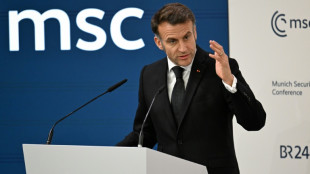
-
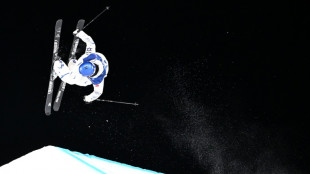 China's freeski star Gu recovers from crash to reach Olympic big air final
China's freeski star Gu recovers from crash to reach Olympic big air final
-
Charli XCX 'honoured' to be at 'political' Berlin Film Festival

-
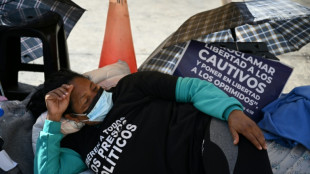 Relatives of Venezuela political prisoners begin hunger strike
Relatives of Venezuela political prisoners begin hunger strike
-
Trump's 'desire' to own Greenland persists: Danish PM
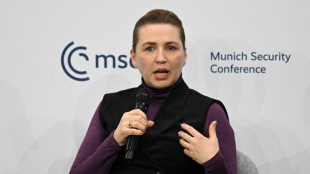
-
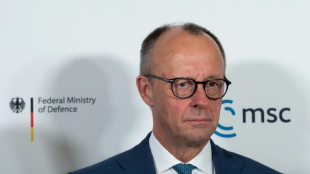 European debate over nuclear weapons gains pace
European debate over nuclear weapons gains pace
-
Newcastle oust 10-man Villa from FA Cup, Man City beat Beckham's Salford

-
 Auger-Aliassime swats aside Bublik to power into Rotterdam final
Auger-Aliassime swats aside Bublik to power into Rotterdam final
-
French prosecutors announce special team for Epstein files

-
 Tuipulotu 'beyond proud' as Scotland stun England
Tuipulotu 'beyond proud' as Scotland stun England
-
Jones strikes twice as Scotland end England's unbeaten run in style

-
 American Stolz wins second Olympic gold in speed skating
American Stolz wins second Olympic gold in speed skating
-
Marseille start life after De Zerbi with Strasbourg draw

-
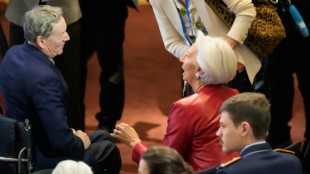 ECB to extend euro backstop to boost currency's global role
ECB to extend euro backstop to boost currency's global role
-
Canada warned after 'F-bomb' Olympics curling exchange with Sweden

-
 Ultra-wealthy behaving badly in surreal Berlin premiere
Ultra-wealthy behaving badly in surreal Berlin premiere
-
250,000 at rally in Germany demand 'game over' for Iran's leaders

-
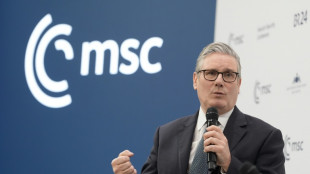 UK to deploy aircraft carrier group to Arctic this year: PM
UK to deploy aircraft carrier group to Arctic this year: PM
-
Zelensky labels Putin a 'slave to war'
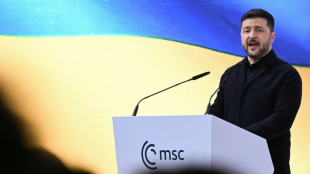
-
 Resurgent Muchova beats Mboko in Qatar final to end title drought
Resurgent Muchova beats Mboko in Qatar final to end title drought
-
Farrell hails Ireland's 'unbelievable character' in edgy Six Nations win

-
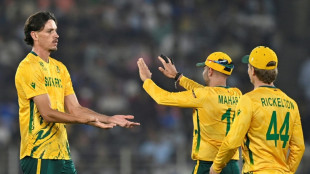 Markram, Jansen lead South Africa to brink of T20 Super Eights
Markram, Jansen lead South Africa to brink of T20 Super Eights
-
Guehi scores first Man City goal to kill off Salford, Burnley stunned in FA Cup

-
 Swiss say Oman to host US-Iran talks in Geneva next week
Swiss say Oman to host US-Iran talks in Geneva next week
-
Kane brace helps Bayern widen gap atop Bundesliga

-
 Ireland hold their nerve to beat gallant Italy in Six Nations thriller
Ireland hold their nerve to beat gallant Italy in Six Nations thriller
-
European states say Navalny poisoned with dart frog toxin in Russian prison

-
 Braathen hails 'drastic' changes after Olympic gold
Braathen hails 'drastic' changes after Olympic gold
-
De Minaur eases past inconsistent Humbert into Rotterdam final


US defends warnings in standoff with Russia over Ukraine
Faced with accusations of "alarmism" over a possible Russian invasion of Ukraine, Washington is on the defensive over the credibility of its warnings, even as it keeps certain cards close to its chest.
"This is not alarmism. This is simply the facts," US Secretary of State Antony Blinken said Monday in a press conference.
Washington in the autumn started sounding the alarm over a massive buildup of Russian troops on its border with Ukraine, accusing President Valdimir Putin of planning a massive attack.
In recent days, President Joe Biden's administration leaked what US intelligence deems the current situation on the border.
Russia already has 110,000 troops on its ex-Soviet neighbor's frontiers, nearly 70 percent of the 150,000 needed for a full-scale invasion, which could be launched by mid-February, according to the intelligence.
But key players have sought to tone down the alarm.
"Do not believe the apocalyptic predictions," Ukraine's Foreign Minister Dmytro Kuleba tweeted on Sunday.
In a small concession, the White House last week walked back on qualifying a potential invasion as "imminent."
This was not long after European authorities had expressed irritation at US rhetoric on the crisis.
"We know very well what the degree of threats are and the way in which we must react, and no doubt we must avoid alarmist reactions," EU foreign policy chief Josep Borrell said at the end of January.
However, on Monday, side by side with Blinken in Washington, he seemed more in step with the Americans.
"We are living, to my understanding, the most dangerous moment for security in Europe after the end of the Cold War," Borrell said.
"140,000 troops massed in the border is not to go to have tea."
- 'Tailored for political means' -
For Nina Khrushcheva, international affairs professor at New York's New School, Washington is in danger of crying wolf.
"The problem with the US credibility is that they've been talking about the imminent invasion for three months now," she told AFP.
"The United States intelligence, we know, not only it's not always perfect, but it's also often tailored for political means."
She cited examples such as the alleged weapons of mass destruction used to justify the 2003 attack on Iraq that were never found, and more recently, the CIA's failure to predict the swift collapse of the Afghan government following the US withdrawal.
An exchange at the State Department's daily press conference on Thursday illustrated a certain discomposure on the part of the US government.
Washington had just claimed to have evidence that Moscow was planning to film a fake Ukrainian attack on Russians to create a pretext to invade.
Pressed on the evidence for such a plot, State Department spokesman Ned Price dodged the issue, saying only the information came from US intelligence and that the decision to make it public was a sign of confidence.
"If you doubt the credibility of the US government, of the British government, of other governments, and want to find solace in information that the Russians are putting out...," Price said in a tense exchange.
The lack of details on the information is understandable for Khrushcheva.
"It is intelligence, so of course no intelligence evidence should be, or is usually, shared," she said.
"It's entirely possible of course the Russians are preparing both for a (false) flag operation or some kind of propaganda campaign, disinformation campaign," she added.
"Once you cry wolf way too often... it doesn't mean the wolf is not coming, but you have to be careful on how long and how forceful you cry."
- 'Difficult balance' -
Caught in the crosshairs, Washington has tried to explain itself, without revealing more.
"The best antidote to disinformation is information, and that's what we've sought to provide to the best of our ability," Blinken said on Monday.
His spokesman also tried to smooth things over.
"I will certainly never be able to give you the proof that you, I'm sure, want," Price said.
"We are trying to strike a very difficult balance" between saying too much and not enough, he added.
"Even as we seek to expose Moscow's efforts, we don't want to jeopardize or potentially jeopardize our ability to collect this kind of information going forward."
Y.Aukaiv--AMWN